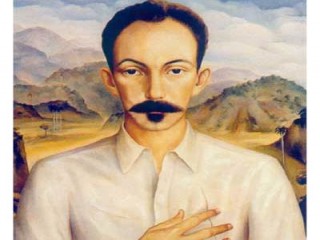
Jose Marti biography
Date of birth : 1853-01-28
Date of death : 1895-05-19
Birthplace : Havana, Cuba
Nationality : Cuban
Category : Famous Figures
Last modified : 2011-08-11
Credited as : Revolutionary, poet, journalist
Jose Marti was a Cuban revolutionary, poet, and journalist. The principal organizer of Cuba's war against Spain, he was the apostle of Cuban independence.
Jose Marti was born in Havana on Jan. 28, 1853, of Spanish parents. In school, where he was an eager student, his teachers aroused in him a devotion to the cause of freedom, and he also achieved early recognition as a writer. At the age of 15 he composed several poems; at 16 he published a Havana newspaper, La Patria Libre, and wrote a dramatic poem, Abdala. Arrested for political reasons, Martiserved several months at hard labor before he was deported to Spain in January 1871.
There Martipublished a political essay, El presidio politico en Cuba, an indictment of Spanish oppression and conditions in Cuban jails. The young revolutionary also resumed his studies, and in 1874 he received a degree in philosophy and law from the University of Saragossa. Martithen traveled through Europe and in 1875 went to Mexico, where he worked as a journalist. After a short visit to Cuba in 1877, he settled in Guatemala, where he taught literature and philosophy. That same year he married Carmen Zayas Bazi¡n, daughter of a Cuban exile, and shortly afterward published his first book, Guatemala.
Unhappy with Guatemala's political conditions, Martireturned to Cuba in December 1878. The Peace of Zanjon, which ended the Ten Years War (1868-1878) against Spain, had just been signed, and Martifelt that conditions on the island would be propitious for his return. Spanish authorities, however, soon discovered his continued revolutionary activities and again deported him to Spain. He escaped to France and from there moved to the United States and Venezuela.
In 1881 Marti made New York the center of his activities, although he continued to travel and to write about the many problems of Latin American nations. Through regular newspaper columns for La Opinion Nacional of Caracas and for La Nacion of Buenos Aires, he gained recognition throughout Latin America.
Marti was noted not only for his journalistic abilities but also for his poetry and prose. He was a precursor of the modernistic movement in poetry. In 1882 his most significant poems, composed for his son, were published in a book called Ismaelillo. Marti's best-known poems appear in Versos sencillos (1891) and emphasize the themes of friendship, sincerity, love, justice, and freedom. Martialso won the hearts of Latin American youngsters with his Edad de oro (1889), a magazine especially devoted to children. His greatest contribution to Spanish American letters was his essays. Written in a highly personal style, they brought about an innovation in prose writing.
Marti realized very early that independence from Spain was the only solution for Cuba and that this could be achieved only through a war that was sudden and that would at the same time prevent United States Intervention in Cuba. His fear of a military dictatorship after independence led in 1884 to a break with Maximo Gomez and Antonio Maceo, two generals who at the time were engaged in a conspiracy against Spain. Marti withdrew from the movement temporarily, but by 1887 the three men were working together again, with Marti assuming political leadership. In 1892 he formed the Cuban Revolutionary party in the United States and directed his efforts toward organizing the war against Spain.
In 1895 Marti gave the order for the resumption of hostilities against Spain and landed in Cuba to lead the war. He was killed in a skirmish with Spanish troops at Dos Rios, Oriente Province, on May 19, 1895.
What distinguished Marti was his ability to organize and harmonize. His oratory inspired his listeners, his honesty and sincerity inspired faith, and his conviction in the ideas he was pursuing gained him the respect and loyalty of his followers. His writings were not mere rhetorical exercises but moral teachings aimed at making man better, and their impact was felt not only in Cuba but throughout Latin America. Like Simon Bolivar, he thought in terms of a continent and advocated the unity of Latin America.
















